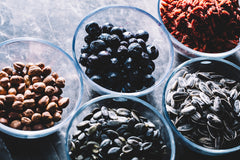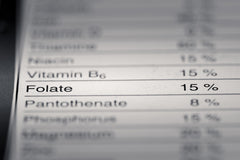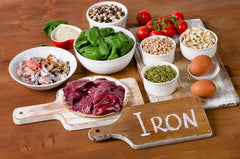Carmela Pengelly is a dietary therapist and nutritional therapist, trained in the UK.
She now lives in Perth, Western Australia, where she practises as a nutritionist, specialising in SIBO (small intestinal bacterial overgrowth), methylation issues, and vegan/vegetarian diets. She also offers consultations outside of Australia, via Skype.
Foods can either be your friend or foe when it comes to anxiety. Poor diet can act as an internal stressor, ramping up anxiety levels. Conversely, eating the right foods can nourish the brain and dampen these emotions, helping you to feel calm and better able to cope. While the science behind anxiety continues to evolve, there are some key areas you can evaluate and watch to ensure improvements when living with anxiety.
The Gaba/Glutamate Balance
Neurotransmitters, which are the chemical messengers of the brain, play an important role in our emotional responses. The most dominant neurotransmitters are GABA (gamma-aminobutyric acid) and glutamate.
GABA and glutamate effectively have opposing actions but, when they work in healthy balance, allow you to feel relaxed, focused and alert most of the time.
GABA helps you feel calm and induces alpha brain wave activity, akin to meditation and mindfulness practices.

Commonly-prescribed tranquilisers on the market, e.g diazepam (Valium) and alprazolam (Xanax), work by increasing GABA.
Glutamate is stimulating and helps with learning and memory; too much causes feelings of anxiety. GABA works to keep glutamate in check by inhibiting its action. GABA also depresses adrenaline production.
We can use foods and natural supplements to boost GABA and thus reduce feelings of anxiety.
There is little evidence that glutamate production is influenced by dietary glutamate (or glutamic acid). However, if your anxiety levels are high, it’s certainly worth cutting back on foods high in glutamate to see if it makes a difference.
These include:
- Foods containing monosodium glutamate (MSG), e.g crisps and other savoury snacks, convenience foods
- Aged cheeses
- Fermented foods e.g soy sauce
- Protein foods
The Role Of Adrenaline And Cortisol
When we are feeling stressed and anxious, our adrenal glands, which sit on top of the kidneys, increase their production of the stress hormones, adrenaline and cortisol.
When these hormones are elevated, they trigger an increase in glutamate.

So it pays to work on reducing stress hormone production as much as you can. You may not be able to control all the anxiety-inducing events in your life (e.g constant deadlines, financial issues, relationship problems etc) but reducing internal stressors go a long way in cutting your overall stress burden.
Internal stressors include anything that disrupts biochemical processes in the body, and as a result induce cortisol production.
You can also use adaptogenic herbs to reduce cortisol production. They are called adaptogenic as they help you to adapt to stress.
Try some of the tips below for reducing stress hormone levels.
When the adrenals are working hard, they use up nutrients very quickly. They are also known as ‘nutrient stealers’ because they commandeer nutrients at the expense of other systems in the body.
We need to provide nutrients to nourish the adrenals to allow them to work properly without depriving the rest of the body of vital nutrition.
Essential nutrients include:
- Magnesium
- Vitamin C
- Zinc
- B vitamins, especially B5
- Protein
The Blood Sugar Anxiety Link
A major contributor to anxiety is dysregulated blood sugar. If our diet is dominated by sugary foods and grains, we take a ride on a blood sugar rollercoaster. We experience a pleasant high followed by a debilitating crash as blood sugar levels suddenly take a dive.
These fluctuations are actually very small but they have a major impact on mood.
You can gradually fix this problem and smooth out unruly blood sugar highs and lows by eating the right foods at the right time.

Protein foods have a much smaller effect on blood sugar than carbohydrates. Meat, fish, eggs, legumes, nuts and seeds and protein powders all count as good protein foods.
Some carbohydrate foods are much worse than others in how they affect blood sugar but it’s not always obvious which ones. For example, white pasta has a much smaller impact on blood sugar compared with white or even wholemeal bread; sweet potatoes are better than white potatoes.
Ideally, if you suffer ongoing anxiety, try stick to a low-sugar, low-grain diet. If you struggle to give up carbs, combining them with protein and good fats (e.g olive oil, coconut oil and butter) will still help to stabilise blood sugar.
Try to structure your meals and schedule them at even times over the day so that you never get too hungry. Keep to your schedule as much as possible.
Be patient – if you’ve had dysregulated blood sugar for a long time, it may take more than a few days to see improvements in your mood. Try keeping a food diary and note down what you’ve eaten and how you are feeling. You’ll then be able to see that you are making steady progress.
|
HEALTHY MEAL SWAPS Eating more fresh foods and adding protein to each meal can help reduce anxiety by stabilising blood sugar and supporting hormone and neurotransmitter balance. |
|
|
MEAL |
SWAP FOR… |
|
BREAKFAST: |
|
|
Cereal |
Protein shake |
|
Toast and jam |
Eggs and mushrooms on toast |
|
|
|
|
LUNCH: |
|
|
Sandwiches |
Salad with eggs, prawns, or cold meats. Add olive oil and vinegar for extra flavour |
|
Baked potato and filling |
Baked sweet potato with protein filling and salad on the side |
|
|
|
|
DINNER: |
|
|
Pasta with tomato sauce |
Pasta with meatballs or tinned tuna |
|
Shop bought microwave dinner |
Grilled salmon and veg. Add butter or olive oil for extra flavour |
|
|
|
|
SNACKS: |
|
|
Chocolate bars and muesli snack bars |
High protein, low carb snack bar |
|
Sweets |
Make a trail mix of nuts, seeds, shredded coconut, and dried goji berries |
|
|
|
|
DRINKS: |
|
|
Coffee and tea |
Rooibos tea, herbal tea, lemon wedge in hot water |
|
Energy drinks or fizzy drinks |
Kombucha or sparkling mineral water |
Coffee And A Smoke
Any stimulant, including coffee, energy drinks and cigarettes, will have the same effect on blood sugar as sugary foods. This is because you are stimulating the adrenal glands, causing them to release stress hormones, which in turn push up blood sugar, regardless of whether or not you have eaten anything.
You don’t have to cut out coffee altogether but if you do suffer anxiety, it’s best to limit coffee to an absolute maximum of three cups (three shots in total) and have it with a meal to slow absorption of caffeine into the bloodstream.
Comfort Eating
A stress-induced blood sugar rise is your body’s way of providing an immediate energy source to muscles in readiness for a flight or fight response.
Unfortunately, this translates as an irresistible drive to eat that sugary doughnut or other comforting snack. It puts you back on the blood sugar rollercoaster and makes you feel worse in the long run.
Evening snacking is a common symptom and can be detrimental to quality of sleep.
Working on healthier blood sugar balance can help to ameliorate these problems.
4 Nutrients That Will Calm You Down
- Magnesium
Magnesium works wonders for stress and anxiety and will also help you if you can’t sleep.
Studies have also shown that magnesium deficiency correlates with increased anxiety.
Magnesium has several actions that help reduce anxiety, including:
- Acting as a natural glutamate blocker
- Supporting the production of GABA
- Replacing magnesium lost through excess excretion during times of stress
- Reducing inflammation in the brain
- B Vitamins
B vitamins are needed for making neurotransmitters, providing energy to nerve cells and protecting against brain inflammation.
Vitamin B6 is particularly importantas it is used in the metabolism of all neurotransmitters and is needed for GABA production.
- Zinc
We have mentioned that zinc is needed to support stress hormone production by the adrenal glands. It is also very important for reducing anxiety by regulating glutamate activity.
Acute stress also depletes our zinc levels and those suffering anxiety have been shown to have lower levels of zinc than other people.
- Amino Acids
Amino acids are the building blocks of protein and the key raw ingredients for making neurotransmitters.
It is possible to directly supplement using GABA but evidence that GABA can be absorbed and used by the brain is inconclusive.
Other amino acids can help support GABA production, however, and reduce adrenaline and cortisol.
Green tea contains a natural amino acid called theanine that has been proven to calm you by boosting production of GABAin the brain. As well as drinking the tea, you can buy theanine as a supplement.
L-Glutamine also boosts GABA levels.
|
FOOD SOURCES OF THE 5 ESSENTIAL CALMING NUTRIENTS |
|
|
NUTRIENT |
FOOD SOURCE |
|
Theanine |
Green tea |
|
Magnesium |
Green leafy vegetables, nuts and seeds, cocoa |
|
B vitamins |
Meat, fish, eggs, mushrooms, green leafy veg, nuts and seeds |
|
Zinc |
Oysters, meat, nuts and seeds |
|
Amino acids: |
|
|
GABA |
Sprouted beans and seeds |
|
Theanine |
Green tea |
|
L-Glutamine |
Cabbage juice, protein foods |
Get The Gut Right
It’s now becoming an accepted fact that microbes living in our gut can influence brain chemistry. Anxiety is a very common symptom of gut flora imbalance. A study of IBS (irritable bowel syndrome) sufferers found that they were 3.5 times more likely to have a psychiatric disorder, including anxiety, than healthy people.

The gut and the brain are believed to communicate via the vagus nerve. Since this communication is a two-way street, stress signals coming from the brain can negatively impact gut function and disrupt microbial balance. You can then get into a downward spiral of gut flora imbalance creating anxiety and anxiety negatively impacting gut flora.
How To Protect The Gut And Reduce Your Anxiety
- Eat fibre-rich foods e.g fruit and vegetables, beans and lentils, nuts and seeds. If you struggle to get enough fibre – around 2 tsp psyllium husks a day in water or on food can help.
- Minimise sugary foods. These will only encourage the proliferation of less desirable microbes in the gut.
- Take a good quality broad-spectrum probiotic every day.
- Eat more fermented foods e.g kombucha, kimchi, kefir and miso. These all help to create the right environment in the gut to promote the growth of good bacteria.
- Eat plenty of herbs and spices, e.g coriander, cinnamon, cloves. These have antimicrobial properties which help to keep ‘bad’ bacteria and yeasts at bay.
Inflamed Brain
Anxiety triggers the release of inflammatory chemicals especially in the brain itself. The more inflamed the brain becomes, the more anxious and depressed we feel, and a vicious cycle of inflammation – anxiety – inflammation ensues.
We can eat more anti-inflammatory foods and minimise pro-inflammatory foods to help put the brakes on this cycle.
You don’t need to cut out pro-inflammatory foods altogether, for example meat provides good sources of amino acids and is beneficial in moderate amounts.
The key is to offset these types of foods with lots of anti-inflammatory ones. Teaming a small steak with a big plateful of fresh, lightly steamed vegetables can provide a good balance, for example.
|
ANTI-INFLAMMATORY FOODS |
PRO-INFLAMMATORY FOODS |
|
Vegetables |
Red meat |
|
Fruit |
Dairy |
|
Olive oil |
Vegetable oils |
|
Fish oil |
Grains |
|
Herbs and spices |
Sugar |
|
Nuts and seeds |
Burnt or barbequed food |
The Plastic Brain
In recent breakthrough research, scientists have discovered that our emotions literally rewire our brains. This is called neuroplasticity. Anxiety changes the structure of certain parts of the brain so that we become more anxious and fearful over time and less tolerant to stressful events.
The good news is that you can help reverse these changes through diet and lifestyle.
Nutrients that help this include:
- Food-based antioxidants, including berries, cocoa, olive oil or anything from the anti-inflammatory list above
- Vitamin E
- Zinc
- Magnesium
- Turmeric
- Fish oil
- B vitamins, especially B1 and B12
Meditation, exercise, and social contact also have an impact. High sugar foods and saturated fats will hinder this process of adaptive neuroplasticity.
If you suffer from anxiety and are struggling to keep it under control through diet, keep in mind the huge number of impacts that the foods and beverages you consume have. From the nutrients your body needs to the negative impact of certain foods, your diet should be a primary point of focus.





